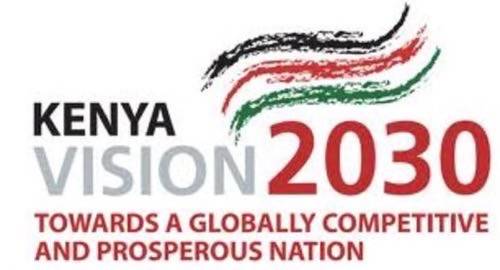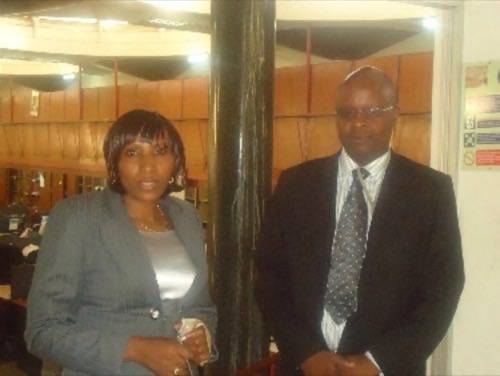“The government has a big role to play in Kenya,” said Paul Kukubo, CEO of the country’s Information and Communications Technology (ICT) Board. “We need to protect the private sector until it can compete.”

We spoke in Kukubo’s office in the Telposta Towers in downtown Nairobi. Out the window, the feathery acacias disguise the frenetic activity on the streets of the capitol, a place and people famous for its determination and energy.
Vision2030
“Eventually, the private sector will have to stand on its own,” added Mugu Kibati, the director general of Kenya’s Vision2030. But that moment, according to the two government officials, is some time off. In the meantime, the government has a lot of work to do.

Governments in Africa, both colonial and post-colonial, have not had an admirable track record in creating or inspiring the creation of wealth in Africa, at least not for people outside the elite. But the recent elections in Kenya, at which the new constitution was adopted, promises to change some of that. Following an uncharacteristic outbreak of legislative and tribal violence during the 2007 elections, Kenyans, much more freaked out by what happened than any observers could be, insisted the new constitution come down heavy on transparency and accountability.
Talking to a dozen public officials over a week, I was left with the strong impression that this accountability is more than a buzzword. Primarily because long-time officials seem distinctly nervous. To be fair, they also seem energized and challenged by the demand to actually create change.
The question is, will historical inertia, cronyism and self-interest trump, or be trumped by, this new sense of mission and responsibility?
Certainly, transparency is no passing fancy in Kenya. This year, it became the first Sub-Saharan African country to launch an open data program.
Digital Insurance Against Graft
My visit to the Attorney General’s state law office and registry was enlightening. Senior Deputy Registrar General Jane Joram showed us an office that had transitioned from all-paper to digital. Prior to the change-over files went missing with an alarming regularity. Most of the disappearances were probably accident, but some were integral to lawsuits and were convenient in way that tested credulity.

Now, all the paperwork from the office, which is responsible for licensing for all business conducted in the country, is digitized. Each application is assigned a separate, cross-reference file ID and backed up, both on an alternate set of servers and, every two weeks, on CD stored in a secure facility. All the initial applications are still done on paper and the storage of that paper is still a self-evident pain. But with an Internet penetration of less than 10%, online applications are not practical yet.
The AG’s office and many others in the government are also routinely shuffled, so that no worker can carve out a bribe-fueled domain within the government. Things are moving, there’s no denying it. But there is still a huge reliance on the magic wand of authority. One of the chief instances of this in Kenya is Vision2030. This is a detailed, and admirable program, with the goal of making Kenya a “middle class country” by 2030. When Mr. Kibati spoke of the program he did so with a great deal of passion and a great deal of faith. But it is, in the end, just a document.
“No government that comes along will be able to reverse this plan,” he told me. Alas, it turns out that is not so. It would be much more accurate to say, “Any administration that comes along could over turn this plan.” It has no force of a constitutional amendment and it has no funding mechanism. That does not mean that this series of policies cannot work, it just means that it does not seem to have an institutional reason for any more success than any other plan. If there is a difference, it is in that enthusiasm and faith that was shared by every government official, and a few private ones, that I met in my time there.
The Silicon Savannah
One of the significant elements in the plan is a breathtakingly ambitious project called Konza Technology City. Modeled on the smart city idea, it is a 5,000 acre public-private partnership designed to evoke the spread of a “silicon savannah” about 30 miles from the clogged precincts of Nairobi at a crossroads and camp called Konza.
The freestanding models which take pride of place in Dr. Bitange Ndemo’s office, as well as the graphics on the city’s website, possess an aesthetic that resembles the offspring of Redwood Shores and the city from Logan’s Run – all swooping lines and spires, planned waterways and shining glass.
Dr. Ndemo is a force of nature in pushing through approval for Konza and in talking it up everywhere from the Kenyan parliament to Silicon Valley. If you’re going to have a spokesman and evangelist you could not do much better than the good doctor. A great bear of a man, he exudes easy-going confidence, respect, intelligence and authority. He was good enough to fly a number of us out to the Konza site on a Kenya Wildlife Service helicopter so I could see the spread from the air and walk it for myself.
Located about 30 miles outside the increasingly overburdened capital, it is currently a spot of grazing land out beyond Nairobi National Park on the Mombasa Road. The scope is hard to mistake from the air. If it gets built, it’s going to be a massive monument to Africa’s future. If it does not, it’s going to be another destination for photographers searching out evidence of industrial-age hubris.
Dr. Ndemo has a number of expressions of interest, from ministries as well as private citizens (one English lord wants to build a stadium there) and companies. But the only work that has yet to be done is the fencing. Under Morris, the fencing supervisor, the first chainlink will completely surround the place in a couple of weeks.

“The government is ripping us off again!” exclaimed one Nairobi resident who was educated abroad and involved in high-tech in the city. Her opinion is not a rare one. “They are going to put up a half-finished ghost town that will smell like, pardon me, like human shit!” In fact, Kenyan government buildings are notorious for that smell, a result of cheaply or improperly built plumbing systems. “If they can’t make the plumbing in a building, why should we trust them to build a tech city!”
If anyone can get this thing through, though, it’s Ndemo. But that is part of the problem, perhaps. Such an undertaking may require a single strong proponent with a powerbase of his own. It may not be enough to have a government believe in the project. But Ndemo made noises about retiring in the next few years, which elicited moans of distress from those who know him, some of whom believe he should run for president.
Pasha
One of the programs fueled by Vision2030 is very cool. Called “Pasha,” Kiswahili for “sharing,” it empowers individual Kenyans to build out from their tech experience. In the pilot program, 37 applicants from around the country were funded through the World Bank to create Internet centers. These centers of digital access are spread around the country. The government’s goal is to get its people wired and give them access to access, and to the skills that access allows.

Each takes the character and emphasis of its owner. The one I visited was Kabete Pasha in Kikuyu Township, and was run by Lucy Kinyanjui, a former NGO worker and American Library Association scholar who spent time in Santa Barbara studying the practical application of public information technology.
Located in a walkup with street access and a courtyard, Lucy’s center is painted pleasantly in shades of purple, red and peach. All the furniture and labor was locally sourced. Lucy’s focus is on education. Ironically, a lot of public education in the country is privately funded. Here students learn video production and even take part in a popular DJing class.
In between classes I met Ignatius Kevin Matimu, Hiram Thume Kimotho and Caleb Okubasu Andayi. The three friends had already staged a play they wrote, winning top prizes at a city contest. They were reviewing their video version of the play and discussing the next production, to take place around Christmas. These were dedicated, super-bright kids who seemed to lack even a nodding relationship with laziness. I’ve known theatre and movie professionals in the States and these guys had their obsession, focus and nerdy joy in the media they were born to manipulate.
“There is no one in my country in the last five to 10 years who can say their life has not been effected by technology,” said Lucy. She and others also registered their belief that the country has more wealth than is commonly known. Banking is not popular, but Kenyans are money-wise and love to make a buck. These Pasha centers will, it is hoped, draw out some of that carefully-husbanded cash and help payer and payee both to increase their wealth.
The Geeks
While having lunch with Dr. Ndemo at Furusato, a Japanese restaurant in the capital, I had the chance to speak at some length with Sam Mwale, an economist in the Office of the President. I asked him, who is so involved with large-scale, government-led projects like Konza, if he had made the opportunity to talk with the 10,000-strong geektropreneur population in the city. He admitted that time and the needs of office had not made that possible, though he had heard a great deal about them.

“Here is my concern,” he confided. “It’s great they’re creative. But in the end, we have to make money, provide for ourselves. Aren’t they going in the end to join Price Waterhouse – who are hiring in Kenya, and leave behind what they’re doing?”
I told him that every incubator and geek group I’d spoken to had focused on helping the creatives to focus on marketable projects and to actually bring those products to market. It was a prime focus. Geekery is undeniable around the world, but in Kenya the focus was on two things: the social problems tech can solve, and the practical means by which their creators can interact with the market.
He seemed surprised, but still a bit skeptical. And why not? No Google had come out of that ecosystem. But when it does, if the government is on the wrong side of it, it heads will fly.
I told Mwale what an incubator manager and several others had told me: If the government wants to benefit from the sweat of geeks, it need only take a relatively small amount of money, say $50 million (compared to the $7-10 billion Konza will require) and form a VC firm of its own, investing $3,000 to $10,000 in seed company into the most promising projects. If you they lose everything at the end of a decade, well, it’s only $50 million. But if they win?
“You could wind up with $50 billion,” enthused Mwale, the economist in him coming strongly to the fore.
Will the government wake up to the power and promise of the nerdpocalypse threatening to blow up in their midst? Will the old-style, top-down master plan approach do more good than harm in a new atmosphere of transparency and accountability? We will see. Though not any time soon.
Next story in the Technotransect series: Afro Nerd Superstar Explosion!
Photos by Curt Hopkins | Disclosure: the Republic of Kenya provided the reporter’s airfare and hotel.

















